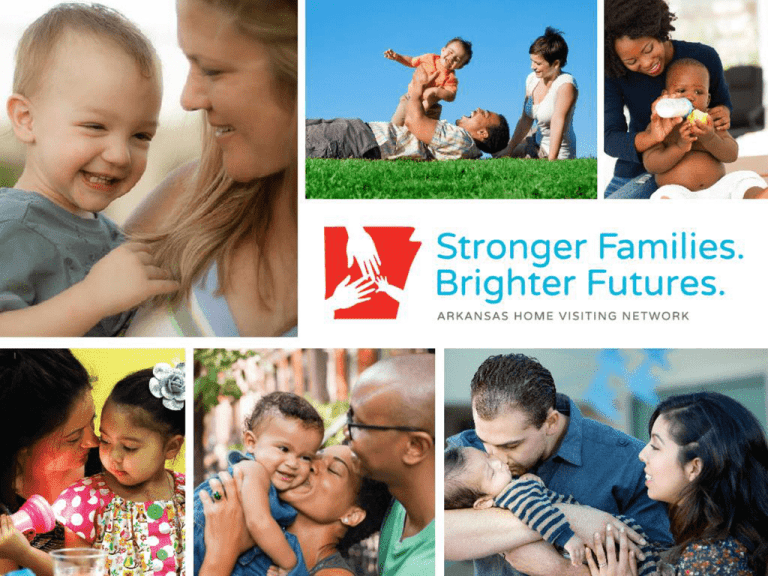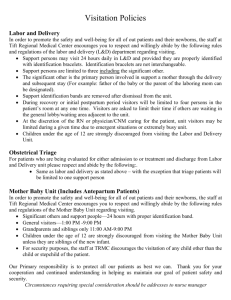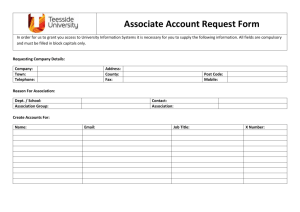Planning as Partners - Arkansas Home Visiting Network
advertisement

Planning as Partners: Individualizing visits for families within each home visiting model Presenters: Jill Bailey, M.S. Cheryl.Anthes, RN Tyra Greenwood, MS Patti McCollum, M.S Carmen Irby, MSN, RNP, CNS – BC Objectives At the completion of this interactive learning session, the participant will: • gain an understanding of qualifying criteria for each home visiting model • understand how to gain understanding and perspective of family needs as he/she meet the visit design • discuss and plan a visit to meet the specific needs of a family while continuing to meet the needs of the developing child during this crisis and keep fidelity of the model. • undertand the value in a collaborative relationship among all home visiting models. Introduction • The Arkansas Home Visiting Network (AHVN) promotes high quality and evidenced-based home visiting services to Arkansas' families during pregnancy and until children enter kindergarten. • Not all home visiting programs are funded through the federal (Maternal Infant Early Childhood Home Visiting) MIECHV grant. • Membership in the network is open to any program representatives offering home visiting services to families. • The goals of the AHVN is to facilitates activities among its members to promote program collaboration, to expand and sustain home visiting services, to collect data, share data, and to share relevant policy and research information. Introduction Models represented today: • Home Instruction for Parents of Preschool Youngsters (HIPPY) • Healthy Families America (HFA) • Nurse Family Partnership (NFP) • Parents As Teachers (PAT) • Following Baby Back Home (FBBH) Home Instruction for Parents of Preschool Youngsters (HIPPY) Program Focus Research shows that parental involvement in education is critical to a child's success in school, and HIPPY helps parents to get involved and stay involved by: – Partnering with parents to prepare their children for success in school – Helping parents empower themselves as their children's first teacher and most important advocate by giving them the tools, skills and confidence they need to work with their children in the home – Bringing families, organizations and communities together to remove any barriers to participation that may include limited financial resources or lack of education Home Instruction for Parents of Preschool Youngsters (HIPPY) Visits • Home Visits provided weekly: Assessments, Developmental Screening & Referral services – 30 Weeks of Curriculum delivered over 10 months for parents of 3 & 4 year old children – 15 weeks of Curriculum delivered over 10 months for parents of 5 year old children • Group Meetings – minimum of 6 opportunities per program year (10 months) Population Served • HIPPY programs serve families from diverse ethnic and geographic groups, particularly those most at risk because of poverty, parents' limited education and social isolation. Home Visitors • High School Diploma, Some College and/or Child Development Associates (CDA) • Serving approximately 5,300 children in 69 Counties primarily through Arkansas Better Chance (ABC & ABCSS) and Maternal Infant Early Childhood Home Visiting (MIECHV) funding. Healthy Families America (HFA) Program Focus • • • • Healthy Families America (HFA) is a nationally recognized evidencebased home visiting program model designed to work with overburdened families who are experiencing stresses that may hinder their ability to nurture and bond with their new babies. Observation and Encouragement of Positive Parent-Child interaction is paramount. Child health and development are monitored during home visits. Intensive Case Management and Referral to community resources is also a vital part of HFA services. Healthy Families America (HFA) Population Served • Clients are enrolled based upon risk factors and area of residence. • Clients are enrolled prenatally or before the new baby is 3 months old. • Services are voluntary and free of charge. Home Visitors • Home Visitors are highly trained, non judgmental, and nurturing. • Most HFA Home Visitors have Bachelors degrees in Human Services or Education. Nurse Family Partnership (NFP) Program Focus NFP is an evidence based model that has 3 goals: • Improve pregnancy outcomes • Improve child health and development • Improve the economic self-sufficiency of the family The NFP model addresses 6 domains with the client during the visits-personal health, environmental health, life course development, maternal role, family and friends, health and human services. . Nurse Family Partnership (NFP) Visits The standard visit schedule: • 1 time a week for 4 weeks after enrollment • every 2 weeks until delivery • 1 time a week for 6 weeks after birth • every 2 weeks until the child is 22 months old • once a month for the last 2 months. There is a core curriculum that is covered with each client plus a more flexible menu of topics the client can chose from depending on her interest or concerns. Population served Low income first time pregnant women, no later than 28 weeks gestation Home Visitors Bachelor prepared registered nurses Parents As Teachers (PAT) Program Focus Parents as Teachers is an evidenced based model with 4 goals: • Increase parent knowledge of early childhood development and improve parenting practices. • Provide early detection of developmental delays and health issues. • Prevent child abuse and neglect. • Increase children’s school readiness and school success. Four Components • Personal Visits • Group Connections • Screenings • Resource Network Parents As Teachers (PAT) Visits Every two weeks with families with 2 or more needs Population Served Families prenatal, birth through kindergarten Home Visitors Bachelor’s degree preferred Following Baby Back Home (FBBH) Program Focus • Improve the outcomes of high-risk infants • Improve child health and development • Improve coordination of medical care and community service needs Visits Provided in 3 phase during enrollment Phase I – 2 home visits/month (first 2 months of enrollment) Phase II – 1 home visit/month (until age 1) Phase III – 1 home visit/every other month; 1 phone call opposite months Following Baby Back Home (FBBH) Population Served Arkansas infant discharged from a NICU and their families Enrollment occurs following the infants’ discharge from the NICU. (0 – 3 years of age) Home Visitors • Registered Nurse and Social Worker team • 6 Arkansas Regions; 56 Arkansas counties. 1 registered nurse and social work team per region Scenario Emily is a young mom who is 17 years old. She is living with her mother and her uncle. She was just dismissed from St. Bernard’s Medical Center in Jonesboro, Arkansas after delivering her second child, a 26-week-old pre-mature little girl. She also has a three year old. She stated that she felt she needed some help because she really wanted to be a good mother to her baby, Callie, and her preschooler, Erin. She said Erin isn’t learning like her cousin’s child and she wants her baby to be OK. Upon completing the family assessment you learned that she had a history of drug use since age 12 but had stopped drinking and using drugs when she found out she was pregnant again. You learned that there were multiple problems in the family including a history of alcohol abuse and violence by Emily’s mother and uncle. 1. What considerations will you have as your initial services with this family? 2. What referrals might be made? 3. What model do you think is the best fit for this child? Scenario Key Points Let’s Talk About It!!! Emily is a young mom who is 17 years old. She is living with her mother and her uncle. She was just dismissed from St. Bernard’s Medical Center in Jonesboro, Arkansas after delivering her second child, a 26-week-old pre-mature little girl. She also has a three year old. She stated that she felt she needed some help because she really wanted to be a good mother to her baby, Callie, and her preschooler, Erin. She said Erin isn’t learning like her cousin’s child and she wants her baby to be OK. Upon completing the family assessment you learned that she had a history of drug use since age 12 but had stopped drinking and using drugs when she found out she was pregnant again. You learned that there were multiple problems in the family including a history of alcohol abuse and violence by Emily’s mother and uncle. 1. What considerations will you have as your initial services with this family? 2. What referrals might be made? 3. What model do you think is the best fit for this child? Conclusion • Each home visiting model has specific criteria for enrollment for services, but the method we us to meet the social, emotional, growth and development needs of our families are very similar. • Today we have met home visitors from each model within our area and throughout the state of Arkansas. We are great resources for each other! • We should begin communicating and collaborating with each other to problem solve, identify resources for our families and work together to transition families from one home visiting program to another home visiting program, as appropriate. Conclusion • Collaborating and problem solving with each other DOES NOT violate HIPPA. You can share the information without revealing the name. • Each of us should be very proud to be a part of home visiting. The impact our models have in the lives of Arkansas families and children not only effect them today and tomorrow but for a lifetime. • YOU are making a difference!!! Conclusion http://www.arhomevisiting.org/online-directory Additional Information on the home visiting models • • • • • • Arkansas Home Visiting Network: http://www.arhomevisiting.org/ Hippy: http://www.hippyusa.org/the_hippy_model.php HFA: http://www.healthyfamiliesamerica.org/home/index.shtml PAT: http://www.parentsasteachers.org/ NFP: http://www.nursefamilypartnership.org/ FBBH: http://www.arhomevisiting.org/app-programs/following-babyback-home If you would like to have a copy of this presentation please email: Carmen Irby: Cirby@uams.edu THANK YOU To find out more about Stronger Families, Brighter Futures, Arkansas Home Visiting Network, please visit us on our website www.arhomevisiting.org All funding for this project is provided by the Maternal Infant and Early Childhood Home Visiting Program of the Health Resources and Services Administration of the U.S. Department of Health and Human Services through the Arkansas Department of Health. Arkansas Department of Health Keeping Your Hometown Healthy



